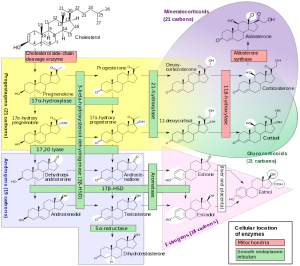aldosterone
A significant percentage of women find that hormone therapy using birth control pills or natural progesterone supplementation is extremely effective for reducing acne blemishes and improving the overall health of the skin. It also helps to lighten periods, reduce cramping and contributes to an overall sense of well being. However, a certain subset of women experience a worsening of symptoms, increased blood pressure or feel just plain “crazy” soon after starting this type of hormone therapy. Fret not dear souls! This scenario has a simple explanation, is seemingly easy to fix and points to a situation that could build into more significant health problems later in life Progesterone, the natural form of the synthetic hormones used in birth control pills, is part of large family of hormones collectively called steroids. Most of us have heard of the more common steroid hormones like estrogen and testosterone. Others include the stress hormone cortisol and the blood pressure hormone aldosterone. When the body has an increased need for a particular hormone (for example cortisol) it can convert other hormones, like progesterone, into whatever hormone it thinks it needs. It does this with the help of enzymes. If you look at the diagram below, each arrow along the pathway is labeled with the name of the enzyme that drives the reaction. (Thanks to Walter F. Boron and Emile L. Boulpaep for their contribution of this beautiful diagram to Wikipedia. )
 Notice progesterone, in the yellow, can convert easily to cortisol and aldosterone through the enzymes 21-hydroxylase and 11-betahydroxylase. The levels of these enzymes ultimately control how much progesterone is converted into cortisol and/or aldosterone. Sometimes there is an authentic need for more of a certain hormone. For example, higher amounts of cortisol are used by the body to moderate inflammation during an immune response or during times of increased stress. Sometimes, our genetic programming simply tells our body to make too many of these enzymes regardless of whether there is a need or not. Regardless of the cause, I am absolutely convinced that rooibos tea is an easy way to begin to slow down the conversion and depletion of progesterone. I got this idea after reading this study[i] demonstrating that rooibos tea had the ability to slow the activity of some of these enzymes and had a normalizing effect on cortisol and aldosterone precursors.
Notice progesterone, in the yellow, can convert easily to cortisol and aldosterone through the enzymes 21-hydroxylase and 11-betahydroxylase. The levels of these enzymes ultimately control how much progesterone is converted into cortisol and/or aldosterone. Sometimes there is an authentic need for more of a certain hormone. For example, higher amounts of cortisol are used by the body to moderate inflammation during an immune response or during times of increased stress. Sometimes, our genetic programming simply tells our body to make too many of these enzymes regardless of whether there is a need or not. Regardless of the cause, I am absolutely convinced that rooibos tea is an easy way to begin to slow down the conversion and depletion of progesterone. I got this idea after reading this study[i] demonstrating that rooibos tea had the ability to slow the activity of some of these enzymes and had a normalizing effect on cortisol and aldosterone precursors.
I suggested this to a few of my patients who I suspected were suffering from this specific scenario. At first, I was unsure if a simple cup of rooibos tea would be strong enough to have any significant impact. I was pleasantly surprised to find all them had noticeable results within a month. Every single one of them reported feeling calmer. Several of them reported an improvement in their sex drive. One of them had her high blood pressure return to normal within three weeks. All of them had significantly easier periods with fewer cramps and clots. One of them had a normal period for the first time in years. Previously, her periods were coming every three weeks and were accompanied by heavy bleeding. She was chronically anemic and alway felt worse with progesterone. This same lady ended up needing to reduce her dose of thyroid medication, which had been the same for years. I’m guessing this is partly because of the effects of cortisol on the thyroid through the adrenal-thyroid axis and maybe partly because progesterone boosts thyroid function. My acne patients who had symptoms of this scenario all improved by at least 20% and two ladies improved by about 70% after one month. Acne is multifaceted so it would be unlikely that rooibos tea would act as a magic pill but it definitely seems to help. I was REALLY encouraged by these results. The lady who had the high blood pressure had a relapse about two months after. At first we couldn’t figure out why but then realized that she had bought some rooibos tea that contained licorice, which is known to elevate blood pressure. When she stopped this her blood pressure returned back to normal within a week. There are a couple unknowns here. To reduce overall inflammation, I have all of my patients stop drinking coffee and alcohol and reduce their sugar intake to less than 7 grams per meal. If someone is still consuming these, I’m not sure if some of these substances might override the beneficial effects of the rooibos and continue to drive the pathway in the wrong direction. I would LOVE to hear your feedback.
Constructive comments that contribute, whether positive or negative, are welcomed. All others will be ignored or referred to trolls who are smarter than you and have nothing better to do.
[i] Schloms L, Storbeck KH, Swart P, Gelderblom WC, Swart AC The influence of Aspalathus linearis (Rooibos) and dihydrochalcones on adrenal steroidogenesis: quantification of steroid intermediates and end products in H295R cells. The Journal of Steroid Biochemistry and Molecular Biology [2012, 128(3-5):128-138]